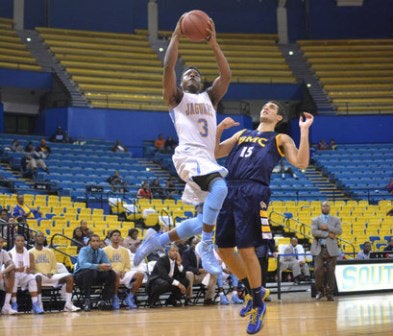
Southern’s men’s basketball team, along with the university’s other 15 Division I teams, still is operating under an NCAA postseason ban imposed in October 2012 due to Academic Progress Rates and Graduation Success Rates discrepancies, which could date back as far as 2008. Southern University Athletic Director William Broussard says the 350-plus student athletes are not to blame; instead, he attributes the NCAA ban to inadequate recordkeeping primarily by the university’s registrar’s office.
“We’re now reconstructing history,” Broussard said. “You’re piecing together all of the parts that have been used to determine eligibility. Rosters [and] squad lists, in many instances, haven’t been stored properly, and then you have to rely on other institutions or re-create the history manually.
“I’ve spent a lot of time looking at stats that happened during competitions and reported from competitions to try and reconstruct squad lists and rosters that we didn’t have on file or in the past that were incorrectly reported to the NCAA,” Broussard continued. “And then I’ve been trying to put together student athletes’ transcript histories that may not have all of the original transcripts of transfer students, so it’s a lengthy process because you have to contact the institution from which the student transferred.”
For Southern, a team that broke conference and NCAA records throughout the 2013-14 season, very little provides solace for what could have been a promising postseason that fell short. Southern coach Roman Banks led his Jaguars to the NCAA tournament last season and said he didn’t expect not to go back. He was named SWAC Coach of the Year, and two of his players, Calvin Godfrey and Tre’Lun Banks, were named newcomer and freshman of the year, respectively. To not play in the tournament because of skill was one thing, Banks said, but he didn’t foresee any academic roadblocks, especially after getting APR scores up to prevent a ban during the 2012-13 season, when the Jaguars won the conference title.
“Well, you know there have been a couple of situations and we did a pretty good job bouncing through it, especially being able to come to the tournament last year after getting our APR scores up,” Banks said. “Then all of a sudden, I learn about another issue regarding institutional control that happened before I got here, but [it] affects us right now, and, at the end of the day, it just wears on you … and I think this mess has just taken away some of their [the players] chances.”
Southern and three other institutions would not have been given a chance to play in the basketball tournament or any of the conference’s sports tournament had it not been for the SWAC Council of Presidents and Chancellors voting to allow them to play. The topic of allowing the teams to play was nothing new for the 10-school conference council. Both Broussard and Southern University Chancellor James Llorens said a few of the schools had been pushing for a couple of years to change the terms of NCAA postseason bans that applied to the SWAC. The council voted 7-3 to allow Southern, University of Arkansas-Pine Bluff, Grambling State University and Mississippi Valley State University—all of which were banned because of APR issues—to participate in postseason conference play.




















